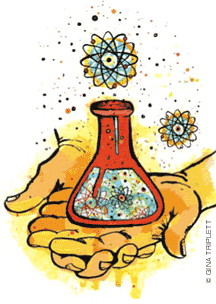
The tide is turning, and the war could be won here
By Judith Rodin
Not long ago, I spotted a New Jersey specialty license plate that displayed a simple yet arresting message: “Conquer Cancer.” Ten years ago, I might have viewed the notion that we could subdue and vanquish this most insidious group of deadly diseases within our lifetimes as a beautiful wish upon a distant star.
Today, cancer continues to be among our deadliest foes, killing 550,000 Amer-icans each year. However, the tide is turning. With the recent discovery of the human genome, as well as other important advances in biotechnology and molecular biology, many of the world’s most creative researchers are edging closer to solving the mystery of cancer.
Armed with clues that could explain the growth of tumors, these scientists are now detecting cancer earlier, treating patients more effectively, and bringing humanity closer to the day when cancer is more easily preventable.
That day could very well arrive at The Abramson Cancer Center of the University of Pennsylvania, where an extraordinary cadre of world-class researchers and clinicians have created a new paradigm both for translating scientific discoveries rapidly into promising treatment and prevention strategies and for adopting an empathetic, patient- and family-centered approach to patient care.
Creating a unique continuum of innovative research and compassionate care where disciplinary boundaries dissolve was the vision of Leonard and Madlyn Abramson Ed’57 GEd’60, whose support and leadership have propelled one of the nation’s leading National Cancer Institute-designated Comprehensive Cancer Centers into one of the best in the world.
Today, the Abramson Cancer Center ranks fifth in funding from the NCI, ahead of Sloan-Kettering. And since 1997, total research grant funding has more than doubled, thus enabling our team of investigators to pursue research and launch clinical trials that are saving lives.
What a team we have.
Director John Glick and Scientific Director Craig Thompson, who are national scientific leaders in their own right, have created a collaborative environment that has attracted an all-star cast of top-flight researchers and clinicians, including Carl June, Barbara Weber, Gary Koretzky, Celeste Simon, and Caryn Lerman.
These outstanding scientists, in turn, have worked with colleagues in 41 departments across eight schools at Penn to produce astounding breakthroughs in cancer research and care.
Consider some of the encouraging developments that have come out of the Abramson Center in just the past two years:
Craig Thompson’s laboratory discovered a link between the growth of cancer cells and an enzyme not previously identified as a cancerous agent. Now, the Thompson lab is partnering with GlaxoSmithKline to convert a “failed” anti-obesity drug into an anti-cancer drug that inhibits this enzyme.
Barbara Weber’s lab has made major contributions to the study of two cancer-related genes (BRCA1 and BRCA2). When inherited in an abnormal form, these genes confer a very high risk for breast and ovarian cancer. In addition to studies evaluating the cancer risks associated with these gene mutations and how best to use these data in clinical risk evaluation, the group has studied ways to reduce cancer risk in high-risk women. Most recently, the group’s findings, which were published in the New England Journal of Medicine, conclusively show that removing ovaries after child-bearing decreases the risk of developing ovarian cancer by 95 percent and breast cancer by 60 percent. This work, along with previous studies from this group, has important implications for genetic counseling and testing in cancer prevention and management.
Carl June’s translational research team is testing the effectiveness of cell-based therapies, known as adoptive immunotherapy and customized vaccination, to reconstitute and strengthen the immune system for fighting off cancer and HIV. In clinical trials, these experimental treatments have achieved promising results. Specifically, June’s team has developed cell-based vaccines that have proved beneficial to individual leukemia patients and to lung-cancer patients who normally would be treated with chemotherapy.
Caryn Lerman, a preeminent authority on genetics and nicotine dependence who directs the Tobacco Use Research Center at Penn, is developing and testing smoking cessation treatments based on the individual’s genetic background.
Lewis Chodosh, one of the Institute’s investigators, helped determine that a medical abortion does not increase a woman’s risk of breast cancer.
Most recently, randomized clinical trials at Penn established that high-dose chemotherapy and autologous bone-marrow or stem-cell transplants were not effective in improving outcomes in patients with metastatic breast cancer. This important finding, which was published in the New England Journal of Medicine, will spare future patients an unnecessary and enervating procedure while saving the country millions of dollars each year in healthcare costs.
These are just a few of the many promising breakthroughs taking place at the Abramson Cancer Center.
Progress has been as dramatic in patient care itself. Not a month goes by without a letter or call from former patients who praise the exceptional quality of integrated care they received from their primary physicians, their nurses and patient-service coordinators, their psychosocial counselors, their nutritionists, and rehabilitation specialists. No wonder. All of these healthcare professionals work as a team that is passionately dedicated to maximizing comfort and creating the best possible prognosis for each patient.
That is why whenever friends or colleagues ask me to recommend a cancer specialist for themselves or loved ones, I direct them straight to the Abramson Cancer Center. I should add that anyone who is seeking thorough, reliable, and up-to-date information on the Internet about specific types of cancer, cancer treatments, and recent breakthroughs in cancer research cannot do better than Oncolink, which receives 10 million hits a month. (Oncolink can be accessed at https://www.oncolink.org.) And if you ask me where I think the war against cancer will be won, I’ll point to a place whose name has attracted the world’s finest researchers while shining like a beacon of hope for cancer patients and their families:
The Abramson Cancer Center of the University of Pennsylvania.

